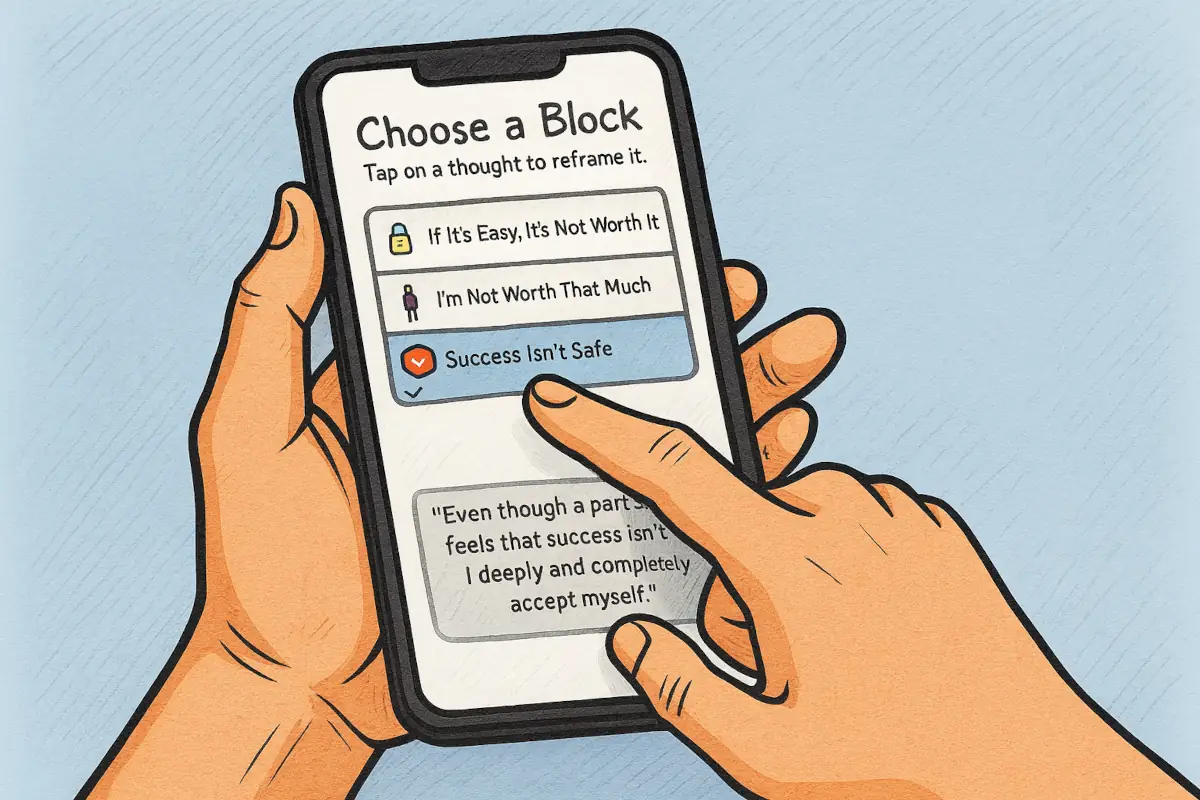Break Through Your Income Plateau by Clearing These 3 Subconscious Money Blocks
(With insights from Dr Brad Klontz)
The late afternoon light slanted across the small desk, catching the edge of a stack of untouched proposals. On the laptop screen, the email draft starred at her blankly — a half-formed pitch she’d been rewriting for three days. Every time she thought about pressing send, her fingers froze above the keys.
Through the open window, the muffled hum of street noise drifted in — cars rolling past, a burst of laughter from the café across the road. She could see him through the glass, a man she’d met once at a networking event, leaning back in his chair with the kind of ease she had never been able to imitate. He was telling a story, head tilted, a loose smile on his face. She’d read about him just last week — another project landed, another deal signed.
He moved like the world kept making space for him. She moved like she had to carve her own space with a dull blade.
The cursor kept blinking.
She shut the laptop. The chair squeaked as she pushed it back, and the sound startled her in the quiet. She went to the kitchen, opened the cupboard, and stared at the row of neatly stacked bowls without really seeing them.
She had worked hard — harder than anyone she knew. Years of taking whatever came, of learning new skills at night, of saying yes to every last-minute request. Yet here she was, in the same apartment, with the same number in her bank account month after month. It wasn’t that she wanted more for greed’s sake; she just wanted to feel the ground stop shifting under her.
The memory came unbidden: a kitchen table from years ago, her father’s hands rough from long days at the factory, her mother counting coins into a jar. “Money’s for needs, not wants,” her mother would say, her voice steady but eyes tired. She’d learned early that comfort came at the end of hard, sometimes punishing work — and even then, it could disappear overnight.
Block One: Making Money Has to Be Hard
Last month, a friend had called with a referral — a project right in her wheelhouse, well-paid, and honestly, something she could have done in her sleep. She’d hesitated, thinking it over for two days before politely declining. The client had sounded too easy-going, the work too straightforward. It felt suspicious.
“It can’t be that simple,” she’d told herself. “Real income takes real sweat.”
Now, watching the man in the café laugh over what was probably another handshake deal, she felt a heat rise in her chest — frustration wrapped in something close to grief.
She leaned against the counter, closed her eyes, and pressed her fingertips lightly against the side of her hand.
Setup: “Even though part of me believes money only counts if it’s earned through struggle, and ease feels dangerous, I accept myself and how I learned this.”
Sequence:
“This feels too easy to be real…”
“I was taught money comes from sacrifice…”
“I don’t trust the easy road…”
“Maybe easy means unstable…”
“What if it’s okay for it to feel light?”
“What if ease can still bring abundance?”
“Maybe I can let it be easy…”
“Maybe I can try.”
When she opened her eyes, the street outside was empty. The man had gone, the chair he’d been in pushed back slightly from the table as if to say, I was here, and now I’m somewhere else, doing the next thing.
She thought of the next proposal on her desk. She didn’t open it.
Block Two: I Don’t Deserve Wealth
The following week, she landed a small job — smaller than she’d planned to take, but the client had called her directly and sounded desperate. They asked her rate. Her number was on the tip of her tongue, but something in her tightened. Instead, she said a figure nearly 30% lower.
She heard herself doing it, felt the words leave like an apology. They agreed immediately, too quickly.
That night, she sat in bed with her knees pulled up, scrolling through messages on her phone. A friend had posted about closing a huge contract — complete with champagne glasses and congratulations flooding the comments. She imagined sending her own announcement and felt the heat of shame creep up her neck.
Who was she to charge more? Who was she to expect better? She could almost hear the old warnings from childhood: “Don’t get too big for your boots.” “That kind of money isn’t for people like us.”
She reached again for the quiet rhythm of tapping.
Setup: “Even though I feel like I don’t deserve more, and asking for it feels wrong, I accept myself and this old story.”
Sequence:
“I’m afraid I’m asking for too much…”
“I was taught not to expect more than I need…”
“I don’t want to seem greedy…”
“I fear people will think less of me…”
“What if my worth isn’t about what I was told?”
“What if earning more lets me help more?”
“Maybe I can trust that my value is real…”
“Maybe I can believe I deserve this.”
Her shoulders eased just a little. It wasn’t a sudden transformation — more like loosening a knot that had been in the same place for years.
Block Three: Having Money is Unsafe
It was the middle of winter when the biggest opportunity yet came through — a retainer contract that could cover her expenses for months. She read the offer twice, then a third time. The rate was more than fair. The client’s tone was warm. Everything in the email said safe.
But in her mind, she could already see the problems: what if people noticed? What if her friends treated her differently? What if family started asking for loans she couldn’t say no to? What if she lost it all and proved she couldn’t hold onto something this big?
Her stomach twisted, and her hands hovered over the keyboard. Instead of “yes,” she wrote a vague note about her schedule being full.
After she hit send, she sat very still, listening to the sound of the radiator clicking in the corner.
Later, she tapped through the rising unease.
Setup: “Even though having more money feels unsafe, like it will cause problems I can’t handle, I accept myself and how I learned this fear.”
Sequence:
“I’m afraid people will judge me…”
“I’ve seen money tear people apart…”
“I don’t want to be a target…”
“I don’t trust myself to keep it…”
“What if wealth could feel safe?”
“What if money could be used for good?”
“Maybe I can protect what matters…”
“Maybe I can see wealth as safe in my hands.”
Rock Bottom
It happened on a Thursday. The same man from the café posted an update: another deal, another win, another photo of him beaming in front of some glossy backdrop. She stared at it longer than she wanted to admit.
The truth pressed down on her. It wasn’t just about him — it was about her own unwillingness to step forward. Every “no,” every low rate, every easy job she’d avoided had built this invisible wall around her.
She thought of the retainer she’d turned down last week. She thought of the proposal she’d never sent. She thought of the hollow place inside her where belief should have been.
Her eyes burned. She gripped the fabric of her sweater until her fingers ached. The room felt too small.
Turning Point
She found herself at the desk again, the same blank email waiting for her. Only this time, she didn’t open the old draft. She opened a new email, typed the client’s name from the retainer offer, and began writing.
Her heart thudded. She tapped as she wrote.
Setup: “Even though I’m scared to take this step, and part of me thinks I can’t hold what I’m asking for, I choose to try anyway.”
Sequence:
“I’m scared of what might change…”
“I’m scared I’ll fail…”
“I’ve failed before…”
“But maybe I can trust myself this time…”
“Maybe I can learn as I go…”
“Maybe I can be the person who says yes…”
“Maybe I can start now.”
She didn’t overthink it. She pressed send.
Resolution
The reply came that evening. A warm yes. The contract attached. No drama, no strings — just the work she wanted at the rate she’d feared asking for.
She signed it.
The next morning, she walked past the café. The man was there again, but she didn’t slow to watch. She kept moving, feeling the steady ground under her feet.
It wasn’t that she had become him — she had become herself, someone who could step into what she wanted without bracing for loss.



